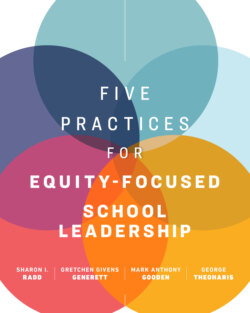Читать книгу Five Practices for Equity-Focused School Leadership - Sharon I. Radd - Страница 28
На сайте Литреса книга снята с продажи.
"But I have to raise test scores. That's what this is all about."
ОглавлениеThe pressure to raise student outcomes, and specifically test scores, has now dominated school improvement efforts for over two decades. In this context, we hear from leader after leader and teacher after teacher, "I have to raise test scores, that's what it's all about."
Principal Natalie came to school administration with a drive and commitment to equity-focused leadership and led her school through significant student achievement gains. She explains that "I have to raise test scores. That's what this is all about" is faulty logic:
Many of my principal colleagues are so hyper-focused on test scores. Their actions and words say, "Once our scores go up, we'll begin to address our disproportionate discipline referrals, talk about more inclusive special education or inclusive EL structures, work on detracking and access, and create a safer, more welcoming school for our LGBTQIA+ students." They don't see that all those issues are related and addressing the pressing equity issues increases opportunities for student learning. Not an immediate fix, but the right one.
Principal Natalie highlighted the problems with this focus on test scores: First, it reduces the definition of achievement and learning to student test scores. Second, it suggests that equity work is separate from, rather than integral to, achievement and learning. Third, it ignores the cultural nature and systemic context of the tests themselves, as well as the ongoing reality that standardized test scores are far more predictive of a person's zip code and family income than of knowledge or intelligence. Last, it blames students and their families for systemic inequities. Over time, she worked with her staff to explore the connections between student learning and other equity issues: When Black students receive more and harsher school discipline, they miss class time, disconnecting them from teachers and learning opportunities. When students with disabilities and ELs lack access to the general education curriculum and peers, it impacts everyone's social and academic growth. When LGBTQIA+ students feel unsafe and devalued, they often withdraw and disengage. Expanding beyond test scores to consider the full range of equity issues creates real school improvement and improves student learning.
